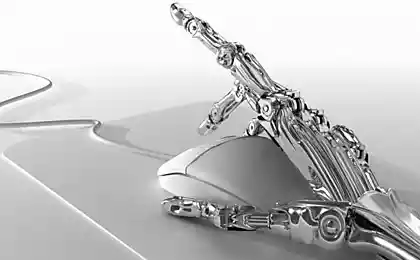754
9 widespread prejudices that prevent you from being rational.
Our brain is capable of many things, but it does have limitations. We all consider ourselves to be reasonable, but we continue to make questionable decisions and make repeated mistakes. Some of them are harmless, but many lead to what we think is irrational. Check with the most common prejudices that should be known by all and sundry.
1. The effect of negativity
The man often draws attention to the bad news. Psychologists believe that this kind of news people perceive as more important. Therefore, many people tend to pay more attention to negative things, ignoring the positive. Most people think that life on the planet is getting worse every year. But Steven Pinker, in his book argues that the level of aggression, violence and crime in the world has considerably decreased. Just now the people are more informed about these cases, as the number of media has increased significantly.
2. Neglect of probability
Likely to die in a car accident is higher than in the plane crash. But still, most people experience a fear of flying. People misjudge the degree of danger and risk. Man often afraid of harmless things and, on the contrary, is not afraid of what is to be feared.
3. Self-confidence
Every person is nice to talk with people with the same opinion as his, and read the information that is similar to his preferences and inferences. Conversely, bad, those who have opposite ideas. Psychologist B. Skinner called this phenomenon of cognitive dissonance. Often we accept only the information that supports our view. Man does not want to accept the fact that it destroys the overall picture of the world. Internet amplifies this trend. So if you're going to someone to prove their opinion in the comments on the forums or on social networks, it is likely you will not succeed.

4. Traps comparison
The stores often people pay attention to prices, especially the difference between them and the price. So many people buy unnecessarily expensive products, since they have a discount. Restaurateurs also enjoy it. In the menu to fit expensive meals to the rest seemed more accessible.
5. This thing was worth
Think of a situation when you are buying something expensive and unnecessary, and then put on the shelf, rather than to bring them to the store. After all, you had convinced himself that "this thing was worth." Our brain is programmed for comfort when you're doing any nonsense.
6. Selective monitoring
Have you noticed ever, some things began to come across your eyes more often than before? Rather, they are the same as it was before, you just do not pay attention to them. For example, a person bought a bike and suddenly began to notice how many people are moved by this kind of transport. And so on ...
7. Herd instinct
Often, we are exposed to the herd instinct, without realizing it. The person getting the team changes frequently, it is starting to like things and phenomena that cause the admiration of most of the environment. This is true heroes, clothes, new-fangled gadgets and so on. It is difficult not to succumb to the general enthusiasm.
8. Silence gives consent?
The selfish human nature shows that the majority of us believe that others think the same as us. Although no prerequisites for this is not. One often assumes that if others do not express their opinion, they agree with his judgments. But this is not so.
9. Think of the future
In one study, people were asked to choose products in the supermarket. Those food acquired for a week in 74% of cases preferred useful products. 70% of those who bought products on the day immediately reached for chocolate. Many of us do not want to think about tomorrow, and wish only to enjoy today.
Knowledge of these cognitive biases will help you prevent serious errors in the future. Forewarned is forearmed. Share this article with your friends!
via takprosto cc
1. The effect of negativity
The man often draws attention to the bad news. Psychologists believe that this kind of news people perceive as more important. Therefore, many people tend to pay more attention to negative things, ignoring the positive. Most people think that life on the planet is getting worse every year. But Steven Pinker, in his book argues that the level of aggression, violence and crime in the world has considerably decreased. Just now the people are more informed about these cases, as the number of media has increased significantly.
2. Neglect of probability
Likely to die in a car accident is higher than in the plane crash. But still, most people experience a fear of flying. People misjudge the degree of danger and risk. Man often afraid of harmless things and, on the contrary, is not afraid of what is to be feared.
3. Self-confidence
Every person is nice to talk with people with the same opinion as his, and read the information that is similar to his preferences and inferences. Conversely, bad, those who have opposite ideas. Psychologist B. Skinner called this phenomenon of cognitive dissonance. Often we accept only the information that supports our view. Man does not want to accept the fact that it destroys the overall picture of the world. Internet amplifies this trend. So if you're going to someone to prove their opinion in the comments on the forums or on social networks, it is likely you will not succeed.

4. Traps comparison
The stores often people pay attention to prices, especially the difference between them and the price. So many people buy unnecessarily expensive products, since they have a discount. Restaurateurs also enjoy it. In the menu to fit expensive meals to the rest seemed more accessible.
5. This thing was worth
Think of a situation when you are buying something expensive and unnecessary, and then put on the shelf, rather than to bring them to the store. After all, you had convinced himself that "this thing was worth." Our brain is programmed for comfort when you're doing any nonsense.
6. Selective monitoring
Have you noticed ever, some things began to come across your eyes more often than before? Rather, they are the same as it was before, you just do not pay attention to them. For example, a person bought a bike and suddenly began to notice how many people are moved by this kind of transport. And so on ...
7. Herd instinct
Often, we are exposed to the herd instinct, without realizing it. The person getting the team changes frequently, it is starting to like things and phenomena that cause the admiration of most of the environment. This is true heroes, clothes, new-fangled gadgets and so on. It is difficult not to succumb to the general enthusiasm.
8. Silence gives consent?
The selfish human nature shows that the majority of us believe that others think the same as us. Although no prerequisites for this is not. One often assumes that if others do not express their opinion, they agree with his judgments. But this is not so.
9. Think of the future
In one study, people were asked to choose products in the supermarket. Those food acquired for a week in 74% of cases preferred useful products. 70% of those who bought products on the day immediately reached for chocolate. Many of us do not want to think about tomorrow, and wish only to enjoy today.
Knowledge of these cognitive biases will help you prevent serious errors in the future. Forewarned is forearmed. Share this article with your friends!
via takprosto cc
The easiest way to make any meal a festive: the colors of vegetables. How nice!
Communication 5 elements with our emotions and internal organs. Reach harmony!























